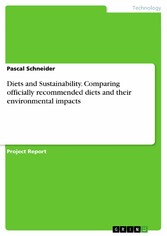Suchen und Finden
Service

Diets and Sustainability. Comparing officially recommended diets and their environmental impacts
Pascal Schneider
Verlag GRIN Verlag , 2020
ISBN 9783346101433 , 31 Seiten
Format PDF
Kopierschutz frei
Geräte
Mehr zum Inhalt

Diets and Sustainability. Comparing officially recommended diets and their environmental impacts
Project Report from the year 2020 in the subject Environmental Sciences, grade: VG, Uppsala University (Earth Sciences), course: Energy, Water, and Food, language: English, abstract: It will be a big issue in the future to combine diets with the planetary boundaries. Not only unhealthy eating habits should be reduced through education and transparency of ingredients. Also, the environmental impact will play a role to keep food production possible in the future. The aim of this report is to investigate how the environmental impact of diets over time changed. The focus will be on German food recommendations. Food plates from the German Nutrition Society (DGE) from 1955 until today will be analyzed as possible diets, that are seen as practicable and healthy from the respective time perspective. The environmental impact can be externalities like GHG emissions, biodiversity loss, eutrophication, et cetera. The report stays broader with the externalities and will use a literature analysis to find out how a diet in general can be seen both as healthy and environmentally friendly rather than focusing on one outcome. Not only is climate change influencing food production. Additionally, the food sector is the main accelerator of climate change, responsible for 10-12 % of total human greenhouse gas (GHG) emissions. Increasing crop production is made possible through a higher yield per hectare, but agriculture today is more and more reliant on fertilizer and pesticide use which is accelerating biodiversity loss: Agriculture influences the phosphorus and nitrogen cycles, leading to water pollution and eutrophication. Pesticide use and monoculture jeopardize pollinators and biodiversity. Food recommendations by the German Nutrition Society (DGE) have been well developed over time, but give a more superficial impression of a healthy diet. Sustainability aspects are rather randomly implemented what shows that health and sustainability correlate. The diet can still be improved in GHG emissions, for example. However, consumption patterns in today's societies are still far away from the diet recommendations (too high in animal products, too low in vegetable consumption). This so-called 'western diet' is a driver of civilization diseases, biodiversity loss, and GHG emissions.
Pascal Schneider ist an einem Montag in den Neunzigern geboren. Jetzt studiert er.
Shop

